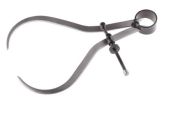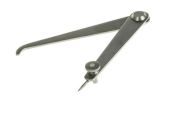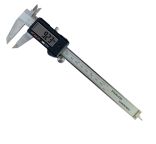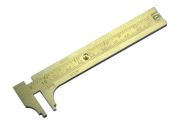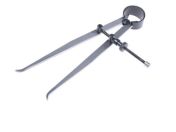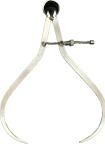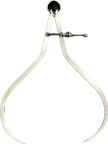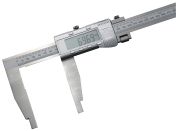Calipers
Calipers are also known as callipers, are a type of measuring instrument with a high degree of accuracy and little margin for error when measuring length, diameter, thickness or distances. These measuring calipers offer features such as digital displays and vernier scales and are mostly found in physics labs, machine shops and engineering applications. There are many styles of calipers but the principle of measuring are the same and RS offer a large selection of calipers to meet your linear measurement needs.
To learn everything you need to know about calipers and their uses, check out our complete guide to calipers.
Types of Caliper
Vernier Caliper
Also known as vernier gauges, vernier calipers are particularly useful when you need to measure something round. They feature a fixed main scale and a moving vernier scale. The main scale is normally in tenths of an inch or millimetres while the vernier scale normally measures to the nearest 0.02 millimetres or 0.001 inches.
Dial Caliper
Dial calipers provide measurements with the same level of accuracy as Vernier calipers. However, instead of using two scales, a dial is used to read the final fraction of an inch or a millimetre on a dial. The measurement taken on a dial caliper is very easy to read.
Digital Caliper
Digital calipers use linear encoders to measure internal and external distances. This is then shown on a digital display which is simple to use and easy to read. Available with metric and imperial conversions so you can accurately measure objects with ease. Digital vernier calipers combine the benefits of both digital and vernier calipers.
Spring Caliper
The primary purpose of spring calipers is to measure the internal and external diameter of an object. They differentiate by the measuring edges and get the name spring caliper by the spring joint that loads onto the nut. To adjust the size of the measuring tips turn the adjuster clockwise or anti-clockwise.
Key features of measuring calipers
Calipers have a robust construction, most commonly made from stainless steel. Some feature anti-glare, or satin finish that makes measurements easier to read. Some calipers will only allow for measurement of the inside or outside, depth or step of a product. However, many do give the option of measuring all of these. Calipers can display measurements in both imperial and metric.
How to Use a Caliper
- Prepare the Caliper: Before taking any measurements, ensure the caliper is properly zeroed. Close the jaws completely and check if the reading is zero. If not, adjust the caliper accordingly.
- Choose the Appropriate Jaws: Callpers have different jaws for different types of measurements. Use the outside jaws for external measurements, the inside jaws for internal measurements, and the depth probe for measuring depths.
- Position the Caliper: Position the caliper jaws or probe against the object being measured, ensuring proper contact and alignment. Avoid excessive pressure, which can distort the measurement.
- Lock the Caliper: Once the caliper is in position, lock the sliding jaw to prevent accidental movement while reading the measurement.
- Read the Measurement: Depending on the type of caliper, read the measurement from the vernier scale, dial, or digital display. For vernier calipers, align the zero mark on the vernier scale with the main scale to obtain the reading.
- Record and Convert: Record the measurement and convert it to the desired units if necessary. Many calipers offer both metric and imperial readings.
Industrial Applications of Measuring Calipers
Measuring calipers are essential tools in various industries, working in tandem with other measuring tools like micrometers, gauges, and rulers to provide accurate readings for diverse applications.
Manufacturing and Machining
Calipers are widely used in manufacturing and machining to measure dimensions of components, ensuring precision and quality control. Digital calipers are often preferred for their ease of use and accuracy.
Quality Control and Inspection
Calipers are essential for quality control inspections, verifying that manufactured parts meet specified tolerances and dimensional requirements.
Engineering and Design
Engineers and designers use calipers to take precise measurements during the design and prototyping phases of product development.
Automotive
Calipers are used in automotive manufacturing and repair to measure various components, such as engine parts, brake discs, and tire treads.
Construction
Calipers are used in construction to measure dimensions of building materials, ensuring accurate fit and alignment of components.
Scientific Research
Calipers are used in scientific research to measure specimens, analyse data, and conduct experiments that require precise dimensional measurements.
Are there calibration options?
We offer calibration on a wide range of vernier calipers and digital calipers. Browse our range now to view all our latest caliper offers with free next day delivery.
Measuring calipers are essential tools for precise dimensional measurements in various industries. Whether you are a machinist, engineer, carpenter, or hobbyist, these instruments offer reliable and accurate measurements, enabling you to achieve the desired results in your projects.
How to Choose the Right Caliper
Different types of calipers offer varying features and functionalities, making it essential to choose the right one for your specific needs. Whether you require a digital caliper for its ease of use or a vernier caliper for its precision, understanding the differences can help you make an informed decision.
1. Type of Caliper
- Vernier Calipers: These are cost-effective and suitable for basic measurements, but require practice to read the vernier scale accurately.
- Dial Calipers: These offer easy-to-read measurements on a dial indicator, but may be less precise than digital or vernier calipers.
- Digital Calipers: These provide quick and accurate digital readings, making them ideal for most applications. Consider features like data output and advanced measuring functions if needed.
- Electronic Calipers: These offer advanced features like data logging, wireless connectivity, and specialised measuring functions, but are typically more expensive.
2. Measurement Range
Choose a caliper with a measurement range that accommodates the size of the objects you need to measure. Calipers come in various sizes, so select one that provides sufficient range for your applications.
3. Accuracy and Resolution
Consider the required accuracy and resolution for your measurements. Digital calipers typically offer higher resolution than vernier calipers, providing more precise readings.
4. Material
Choose a caliper made from durable materials like stainless steel to ensure longevity and resistance to wear and tear.
5. Features
Consider additional features that may be beneficial for your applications, such as a depth probe, fine adjustment, or data output capabilities.
6. Price
Digital caliper prices vary depending on features and accuracy. Compare prices and features to find a caliper that meets your needs and budget.
Trusted Measurement Calipers Manufacturer, Supplier & Distributor in Australia
RS Components is your trusted source for high-quality calipers in Australia. We are a leading manufacturer, supplier, and distributor of a wide range of measuring calipers, including digital calipers, vernier calipers, and digital vernier calipers. We proudly offer products from top brands like Mitutoyo, SAM, and Facom, ensuring accuracy and reliability.
Whether you need engineering calipers for precise measurements or digital calipers for ease of use, we have the perfect solution for your needs.
Explore our extensive range of calipers and experience precise and reliable measurement for your applications.
Buy Calipers from RS
RS offers fast delivery of calipers and other measuring tools like bore gauges, torque testers, and parallel sets. For more details on delivery services and fees, please refer to our Delivery page.
Popular Searches
Related links
- How to Choose the Best Vernier Calipers & Digital Calipers: Calipers Recommendations
- Mastering the Vernier Caliper, A Practical Guide
- Everything You Need To Know About Calipers
- Mitutoyo 150mm Imperial, Metric
- Vernier Calipers: A Must-Have Precision Tool for Every Homeowner
- Mitutoyo 200mm Imperial, Metric
- Mitutoyo 500mm Vernier Caliper 0.05 mm Resolution, Metric
- Mitutoyo 150mm Vernier Caliper, Metric



